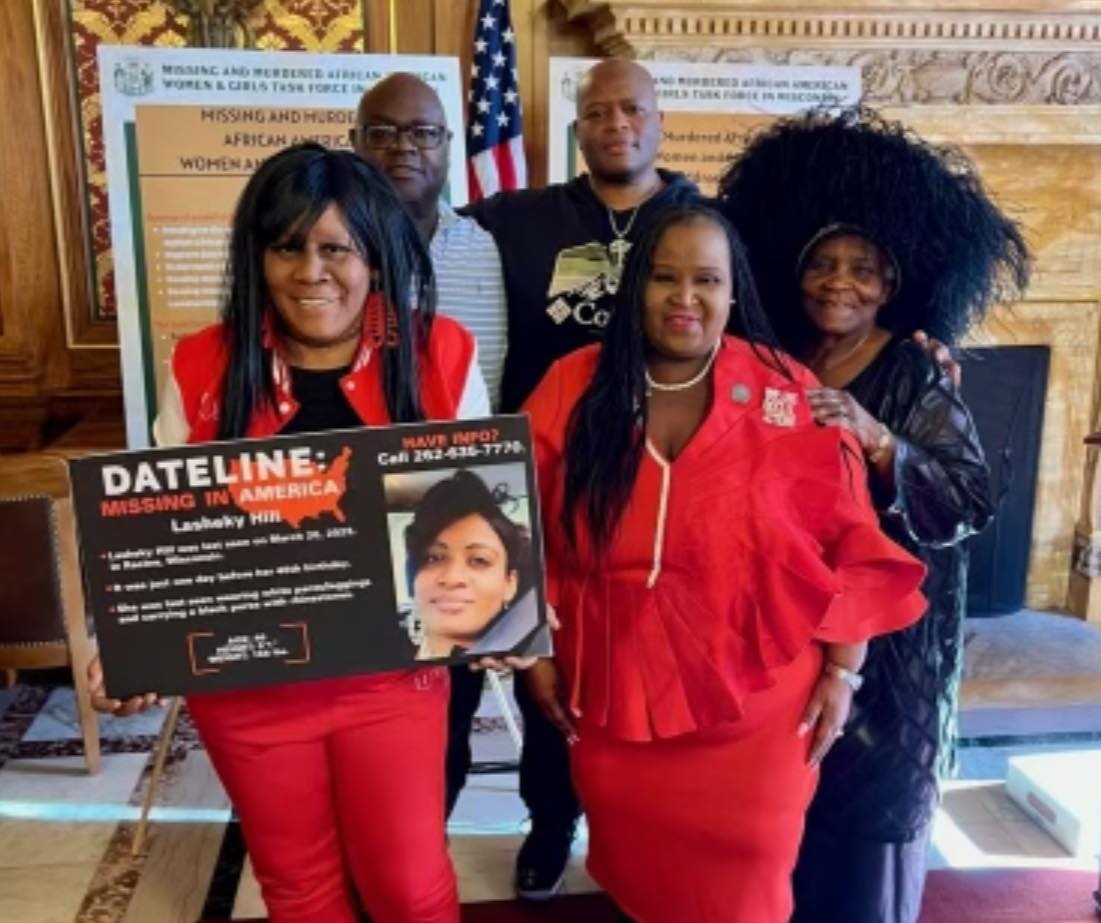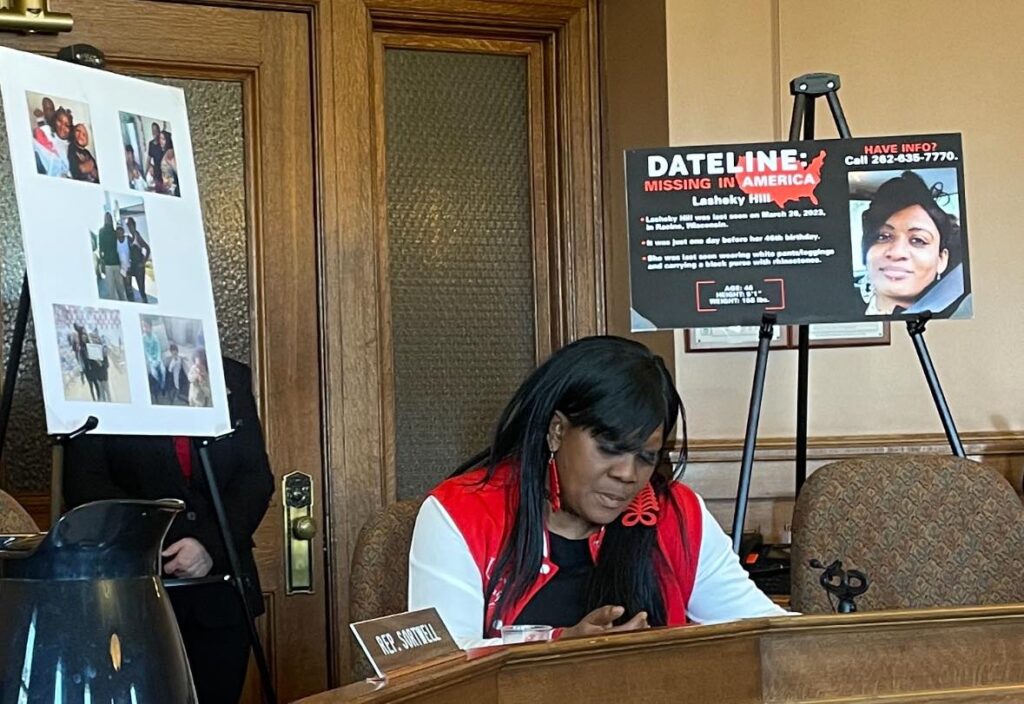
State Rep. Shelia Stubbs (D-Madison) remembers as a child reading about and seeing on TV the Atlanta child murders that took place between 1979 and 1981. Over the two-year period, approximately 29 African-American children, teens, and young adults — mostly boys — were kidnapped and murdered.
“That is something that always stuck with me … who is murdering these kids? And then I remember growing up going in grocery stores and when you first walk in the store, there was a section for missing persons,” Stubbs says. “I was always drawn to that section and I would read the bulletin board looking to see if I had seen individuals and if there was anything that I think would resonate with their faces, hoping that when I came back, I would learn that person had been found.
“I would always see milk cartons, as a child, with missing persons on the back, too. That always stayed in my mind as a child and I thought to myself: When I get to a point someday where I can make a difference with these family members, I want to do that,” she adds.
Four decades later, Stubbs and her fellow members of the Wisconsin chapters of Delta Sigma Theta Sorority, Inc. are teaming up to tackle the critical issue of missing and murdered African American women and girls. Stubbs and the Deltas were out in full force as the Assembly Committee on Criminal Justice and Public Safety held a public hearing Jan. 17 at the Wisconsin State Capitol building on Rep. Stubbs’ proposed bill, AB 615/SB 568, to create a task force on missing and murdered African American women and girls, a bipartisan proposal.
“As I started this work, I talked with my sorority. I’m a part of the social action committee [for the Deltas] and we always do work around domestic violence,” Stubbs tells Madison365. “And so with human trafficking and missing murdered African American women and girls, I thought this bill would be a great piece of legislation that we could work on at a local level to hopefully reach it at a regional level and then at a national level.”
Last year, Delta Sigma Theta Sorority Incorporated had its Delta Days at the Capitol, and Stubbs shared and presented on this legislation.
“So they had a year to read about the legislation and to ask questions. This year was their Advocacy Day back at the state capitol. From last year in March until this year, we have merged on the conversation to have Deltas support me in this work,” Stubbs says. “I was honored again to have over 30 sorority sisters at the Capitol, advocating specifically on AB 615, missing and murdered African American women and girls passports.”

(Photo by Shelia Stubbs)
Last week, Stubbs and others provided testimony alongside Georgia Hill, the daughter of Lasheky Hill, a 46-year-old African mother and grandmother from Racine who has been missing for almost a year. Georgia Hill, who was featured on NBC’s Dateline, said that she last saw her daughter on the morning of March 26.
“Georgia Hill began the advocacy for her daughter and she shared in her testimony at a Criminal Justice Public Safety Committee in the Assembly that when she reached out to law enforcement, and her daughter had been missing for eight hours at this point, she said, ‘Look, my daughter is missing. Something is not right. There’s no way my daughter would not have communicated with me on our birthday. We talk all the time. This is not the behavior of my daughter.’
“And she said that law enforcement responded to her, ‘Did you know your daughter has a warrant? Did you know your daughter was on drugs? Maybe she ran away.’ Ms. Hill felt as though she was being disrespected and they were giving her all of these conditions but they weren’t really dealing with the fact that her daughter was missing. Mrs. Hill shared her frustration.”

Lasheky is 5’1”, 168 lbs., and has black hair and brown eyes. According to the Racine Police Department, she was last seen wearing white pants and carrying a black purse with rhinestones. Stubbs says that Mrs. Hill’s case is “every mother’s nightmare.”
“How did I watch my daughter walk out of my door, turn the corner and I never see her again? Mrs. Hill shared that she now has custody of Lasheky’s 12-year-old son and she shared how difficult it is for him to understand that his mom just vanished,” Stubbs says. “And so she shared some of her struggles and how she tries to get through it day by day.”
Stubbs says the next steps are coming today when the Assembly Committee on Criminal Justice and Public Safety will hold an executive session on Assembly Bill 615, creating a task force on missing and murdered African American women and girls.
“That session will take place on Wednesday at 10 a.m. and at that time, we’re hoping to get a bill passed out of that committee. And then the next step would be to get it on the Assembly floor to get the bill voted out of the Assembly house,” she says. “At the same time, the bill has also been referred in the Senate house to an oversight committee, and I’m hoping we can at least get a hearing on the bill on the Senate side and hopefully make it through to the floor in time for this session.”
In Wisconsin, African American women and girls missing and murdered at disproportionately higher rates than their white counterparts. Stubbs says that the rate of African American femicide across the U.S. in 2020 was 8/100,000, which is four times the rate of femicide among the white female population.
“Black women were murdered in the United States every day in 2020 – five Black women were murdered every day,” she says. “So each day that I’m living, the stats tell me five women were killed. This is completely unacceptable. We cannot stand by and allow these numbers to continue to grow. This disparity must be addressed.
“We need to begin to study the strategies, collect the data, and begin to bring closure to these families so that we in the state of Wisconsin will not be known as a state where we have the highest rate and did nothing,” she adds. “We have bordering states – Minnesota and Illinois – who are doing a lot on this; we need to be, too.”



